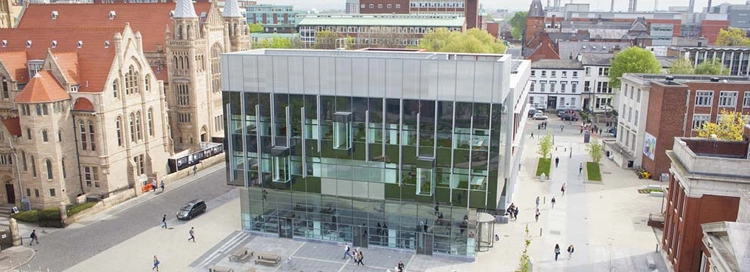

Studying Abroad; A Modern Englishman in New York?
It’s the cliché of all cliches, leaving your small town and watching the horizon broaden. Writers way above my paygrade have relished in watching your life disappear in the rearview and waiting for your bones to grow old enough that you want to come back. Regardless, it was indeed my lived experience. University was always the dream, and I was around eight years old when I realized that I wanted to go to the United Kingdom. I was young, had unsupervised internet access, and used it to browse the QS world rankings. This lead me to the conclusion that I belonged in a big, bustling city of academics, and once my youth was on the cusp of expiration, a quaint town consisting of nothing but perhaps a Tesco and bridges between castles. The Boris Brexit Escapade was none of my concern because I was to study the stars. Freshly nineteen, I did indeed make it to the University of Manchester to complete an integrated master’s in physics. Disheveled I stumbled off my Ryanair flight, overwhelmed and my pockets deep in debt. I arrived, like many students, to the Fallowfield campus where my journey began.
I didn’t know what to expect, and I certainly didn’t know to expect Fallowfield. A cultural embroidery with south-Asian silk, and so undeniably run by and for students; I’d never seen anything like it, nevermind lived it. The campus itself stuck out like a sore thumb with the backdrop of Rusholme, and small-town life had grossly underprepared me in terms of scale. Everything felt few and far between, even though I’d never been surrounded by more options and diversity in my life. As I came back from my first official day of university and said my teary goodbyes to the family that had helped me move, it dawned on me that for the first time, I didn’t have any friends. Yet, anyway. A massive yet; I’ve found that being alone in Manchester attracts experiences, friends, and opportunities pretty immediately. My wide eyes and annoyingly American accent was a flame that few welcoming northern moths could resist. I signed up for lacrosse, a sport where the extent of my knowledge was that it was Regina George’s true calling in Mean Girls, I started volunteering and I cemented my love for astrophysics with a membership at “astrosoc” and a trip to the UNESCO World Heritage Site, third biggest radio telescope in the world, international headquarters in an interferometry project; the Jodrell Bank. This is where I met one of my best friends, a lovely five-foot scouse girl that has carved a home into my heart forever. She and I have been inseparable since; she introduced me to British (northern, rather) drinking culture, small-talk, and showed me grace when I repeatedly exclaimed “I don’t do if buts and maybes, I do absolutes”, sounding more Irish if anything. It was like my heart settled into every nook and cranny of Manchester, but my anxiety still ran wild regarding the actual degree aspect of it all.
I had absolutely no idea what it meant to “have A-levels” and I was absolutely sick to my stomach to learn that people sat three papers per subject. I also realized that a difference in syllabus, regardless of how slight, could really impact your enjoyment of a module, and unfortunately your view on a lecturer. I’m actually quite glad to say that first semester was a humbling experience. It was hard to adjust to exams and the way they were conducted; I suppose anyone pursuing a university degree can relate to that, but studying in the UK means you also have to accept that everyone else has actually sat exams of this time crunch before. I was used to the Nordic five hours; snacks decorating the desk, computers and textbooks front and center, but restricted internet access. The most valuable thing I learned in Manchester in January was that it was okay to be a little more lost than you thought you were. I learned that regardless, I couldn’t lose my spark. I stayed a student rep, and even joined the EDIA (equality, diversity, inclusion, and accessibility) committee. If there is ever a moment of darkness, the best support will be immersing yourself in what you love and what you know. I adapted my study methods to improve how much information I retained and reduce how much content needed proper revision once the spring exam time arrived. I swear by the Cornell method and even though the sound of stylus hitting iPad screens is becoming evermore deafening in the Engineering building, you can pry my paper notebooks from my cold, dead hands. With even more challenging material, I found myself improving in second semester and being excited to see what second year has in store.
Unfortunately, I can’t claim that this is transferable to anyone else. I can’t guarantee that you develop a strange fondness for the Sainsbury in Fallowfield but a preference for Morrisons, or that your local Costa coffee will be where your pre-uni de-briefs take place. All I know is that studying at a world leading university, at such an accredited and famous department, in a city so vibrant, is going to change your life. I’m forever grateful for the massive suitcases my family and I dragged across the sea, the lecturers I’ve met so far, and for the nights I’ve spent in both libraries and club lines. Fear, uncertainty and imposter syndrome can turn into something so truly exciting and beautiful. I am so glad I had the chance to refresh my email on the beach, and to see that UCAS confetti in the backseat of our family car- it altered the course of my life, and it can yours too.
- Ajla

Student Accommodation in the UK
Where do you live when studying abroad? Do universities in the UK offer student housing? How much does student accommodation cost? Did you know that as an international student, you are guaranteed on-campus accommodation for the first or all your years studying at most of our UK universities? You will need to apply by the housing application deadline, and of course the best student accommodation in the UK goes first - so that is a good reason to apply early! There are several different student accommodations, price levels and facilities to choose from!
Most students choose to live on campus in their first year. This is social and a fantastic way to get to know students from all over the world! After that, most students choose to move into privately rented accommodation with their new friends. We recommend everyone to live in university accommodation in their first year, as it is a great way to get to know other students (and not just those on your degree).
Learn more about the different options, on-campus accommodation, how to arrange private accommodation and everything you need before applying for student accommodation in the UK via this webinar!

Visa for European Students who want to study in the UK
Do you want to study in the UK and are wondering if you need a visa? Maybe you have applied to British universities already, or are considering applying to university in London or elsewhere in the UK, but would like to know more about the UK student visa for European students? This webinar recording is about the UK Student Visa for students who will be starting their studies at a British university and are from European countries. We cover everything regarding the CAS, the application process, cost and other practicalities worth thinking about when applying for a student visa.
Did you know that all non-UK students need a visa to study in the UK? How much does a student visa cost? Is it difficult to get a student visa if you want to study in England, Scotland, Wales or Northern Ireland? For most European students in the UK, a student visa is now a fact.
After the UK left the EU, student visas have now become a reality for the vast majority of international students. It is therefore important to familiarise yourself with this process as early as possible, so that you are well prepared when the time comes to submit an application for a student visa. In this webinar recording, we will go through useful information about student visas, when to apply, what you need for the application, costs, and other tips and tricks that can make the process easier. This webinar is suitable for those who have already applied, those who have accepted an offer, but also those who are considering studies in the UK and want to know more about the visa process.
We have the information and tools most people need to be able to go through the visa process without the need for individual follow-up/advice beyond the general information and guide from us. Remember that Across the Pond cannot provide individual advice on your visa application, only certified immigration staff can. In this webinar recording, you will learn about a number of important points that are good to be aware of when you familiarise yourself with the visa process.

Digital meeting with a Student Advisor
Book an online session with an advisor with Across the Pond to learn more about studying in the UK!
- Make sure you book the meeting at least 2 days ahead of time
- If you want to talk over for instance Teams, just type that into the "Teams-ID" field and we'll arrange to send you a meeting link via Teams (you do not need a Microsoft Teams user)


